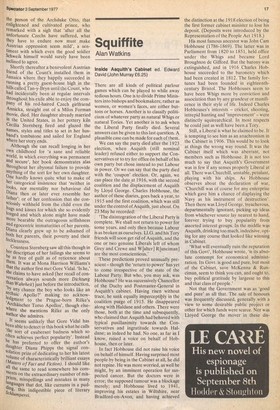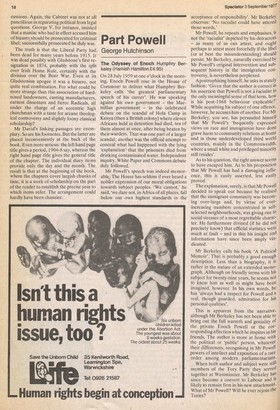Squiffite
Alan Watkins
Inside Asquith's Cabinet ed. Edward David (John Murray E6.25) There are all kinds of political parlour games which can be played to while away tedious hours. One is to divide Prime Ministers into bishops and bookmakers; rather as women, or women's faces, are either buttons or horses. Another is to classify politicians of whatever party as natural Whigs or natural Tories. Yet another is to ask when the Liberal Party finally died. Several answers can be given to this last question. A plausible case can be made for each of them.
We can say the party died after the 1923. election, when Asquith (still nominal leader) refused either to support the Conservatives or to try for office on behalf (Allis own party but chose instead to put Labour in power. Or we can say that the party died with the 'coupon' election. Or, again, we can place the date at 1916, with the second coalition and the displacement of Asquith by Lloyd George. Charles Hobhouse, the author of these diaries, goes back a year, to 1915 and the first coalition, which was still under the control of Asquith, just about. On 23 May he recorded: 'The disintegration of the Liberal Party is complete. We shall not return to power for some years, and only then because Labour is as broken as ourselves. Ll.G. and his Tory friends will soon get rid of Asquith, and the one or two genuine Liberals left of whom Grey and Crewe and Matter] Riunciman are the most conscientious.'
These predictions proved unusually prescient — though the 'return to power' has yet to come irrespective of the state of the Labour Party. But who, you may ask, was Hobhouse? He was successively Chancellor of the Duchy and Postmaster-General in Asquith's cabinet. Having risen without trace, he sank equally imperceptibly in the coalition purge of 1915. He disappeared along with Haldane and others. There were those, both at the time and subsequently, who claimed that Asquith had behaved with typical pusillanimity towards the Conservatives and ingratitude towards Haldane; as indeed he had. No one, as far as I know, raised a voice on behalf of Hobhouse, then or later.
In fact Hobhouse did not raise his voice on behalf of himself. Having surprised most people by being in the Cabinet at all, lie did not repine. He was more worried, as well he might, by an imminent operation for suspected cancer. But the doctors were in error; the supposed tumour was a blockage merely; and Hobhouse lived to 1941, improving his estates in Wiltshire, near Bradford-on-Avon, and having achieved the distinction at the 1918 election of being the first former cabinet minister to lose his deposit. (Deposits were introduced by the Representation of the People Act 1918.) His most famous ancestor was John Cam Hobhouse (1786-1869). The latter was in Parliament from 1820 to 1851, held office under the Whigs and became Lord Broughton de Gifford. But the barony was extinguished, and in 1916 Charles Hobhouse succeeded to the baronetcy which had been created in 1812. The family fortunes had been founded in eighteenthcentury Bristol, The Hobhouses seem to have been Whigs more by conviction and association than by any grandeur or munificence in their style of life. Indeed Charles Hobhouses's interests — cricket, shooting, intrepid hunting and 'improvement' — were distinctly squirearchical. In most respects he could just as well have been a Tory.
Still, a Liberal is what he claimed to be. It is tempting to see him as an anachronism in the Cabinet in 1906. This would be to look at things the wrong way round. It was the Cabinet itself which was aberrant, not members such as Hobhouse. It is not too much to say that Asquith's Government was in few if any senses properly Liberal at all. There was Churchill, unstable, petulant, playing with his ships. As Hobhouse observes about the declaration of war, 'Churchill was of course for any enterprise which gave him a chance of displaying the Navy as his instrument of destruction'. Then there was Lloyd George, treacherous, departmentally ignorant, picking up ideas from whichever source lay nearest to hand, forever trying to buy popularity from assorted interest groups. In the middle was Asquith, drinking too much, indecisive, opting for any course that looked like winning in Cabinet.
'What will eventually ruin the reputation of this Govt'. Hobhouse wrote, 'is its absolute contempt for economical administration. Its Govt. is good and pure, but most of the Cabinet, save McKenna & Runciman, seem to think you can, and ought to, buy political gratitude by largesse to this and that class of people.'
Not that the Government was as 'good and pure' as all that. The sale of honours was frequently discussed, generally with a view to some desirable public project or other for which funds were scarce. Nor was Lloyed George the mover in these dis cussions. Again, the Cabinet was not at all punctilious in separating political from legal• questions. George V, for instance, insisted that a maniac who had in effect accused him of bigamy should be prosecuted for criminal libel; succcessfully prosecuted he duly was.
The truth is that the Liberal Party had , been dead for many years before 1915. It was dead possibly with Gladstone's first resignation in 1874, probably with the split over Irish Home Rule, certainly with the division over the Boer War. Even at its Gladstonian apogee it was a bizarre, not quite real combination. For what could be more strange than this association of hardnosed landowners, canting manufacturers, earnest dissenters and fierce Radicals, all under the charge of an eccentric high churchman with a taste for arcane theological controversy and slightly loony classical scholarship?
Mr David's linking passages are exemplary. So are his footnotes. But the latter are placed inconveniently at the back of the book. Even more serious: the left hand page title gives a period, 1904-8 say, whereas the right hand page title gives the general title of the chapter. The individual diary items provide only the day and the month. The result is that at the beginning of the book, where the chapters cover largish chunks of time, it is a work of scholarship on the part of the reader to establish the precise year to which items refer. The arrangement could hardly have been clumsier.































 Previous page
Previous page